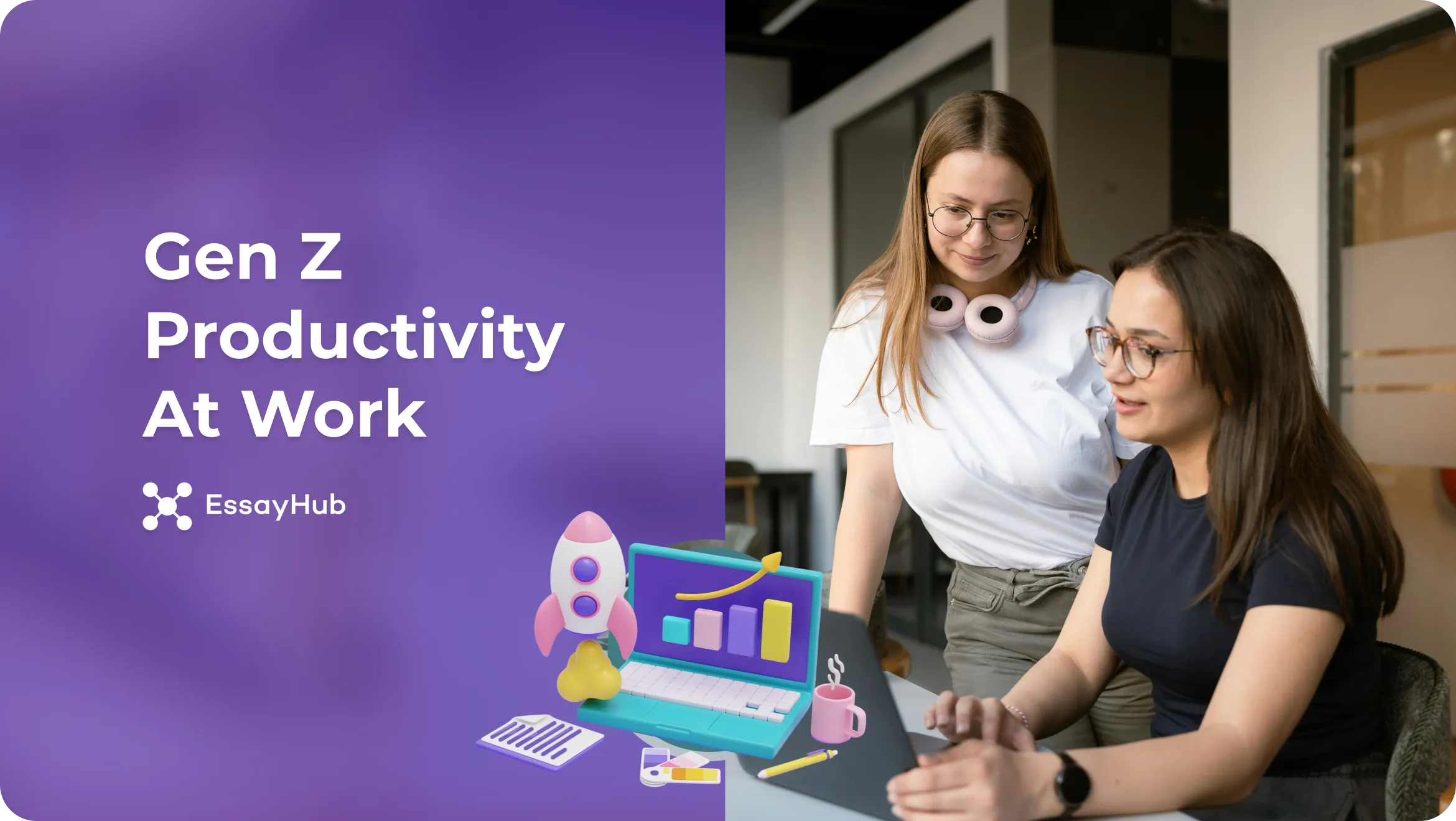Key Takeaways
- More people are starting to question if a college degree is really worth it.
- Most young adults in the workforce don’t have a degree, and plenty are doing just fine.
- College still leads to better pay and more financial stability over time.
- Things are looking up across the board, even for those without a degree.
- The gap between college grads and non-grads is still there, but it’s not as wide as it used to be.
Here's something most people don't expect to hear: only 22% of U.S. adults think a four-year degree is worth the price. 29% say the whole thing just isn't worth it anymore. The real story, though, lies in the numbers behind these opinions: why fewer people see college as the default path and how those without degrees are doing economically.
This article walks you through the college degree vs. no college degree debate with clear stats and insights on the topic. And if you're the one working hard toward your own degree, EssayHub can connect you with an essay writer service that can help you get a few steps closer to the finish line.
College Degree Statistics
A lot has shifted in how Americans view college education, and the stats below offer a clearer picture of what's going on.

Just 22% Say It's Worth the Cost
That's not a small number but rather a warning sign. For approximately one in five people, high fees cancel out the value of a college degree, especially when the tuition in the most expensive college in the US can climb well into the hundreds of thousands.
Only 1 in 4 Say a Degree Is Very Important for a Good Job
That once-essential diploma doesn't hold the same weight it used to. Just 25% of adults still see it as a must-have for landing a well-paying job. Most see it as helpful at best, unnecessary at worst.
Nearly Half Believe College Matters Less Than It Did 20 Years Ago
Ask around and you'll hear the same thing: college used to mean something different. 49% of adults say it's lost some of its edge in the job market compared to two decades ago.
54% of Young Workers Don't Have a Bachelor's Degree
That's more than half. Most young people in the workforce today are figuring things out without a traditional four-year degree. Trade schools, certifications, and self-taught skills are filling that space.
Noncollege Young Men Have Seen Their Earnings Rise
After years of falling wages, young men without degrees are finally seeing better paychecks. It's not a total rebound, but it's a shift in the right direction, and it's definitely catching attention.
Full-Time Work Is Up Across the Board for Women
More women (college grads and non-grads alike) are working full-time, year-round jobs. And those numbers are higher than they've ever been. It's one of the strongest labor shifts in recent history.
College Grads Still Say It Helped Their Careers
When asked if college gave them the skills for a well-paying job, 58% of grads said yes. Only 26% of those without a degree say the same.
Politics Plays a Role in How People View College
There's a noticeable divide here. About half of Republicans think a degree isn't too important for earning a good salary, while only 30% of Democrats feel the same. That gap shows how value judgments around college aren't just economic but also cultural.
How a College Degree Shapes Income and Job Security
Financial outcomes still lean heavily in favor of those with a diploma. The numbers speak loud and clear: a college degree changes both job stability and lifetime earnings. Let's look at the data to be sure:

- Over their lives, people who hold a bachelor's degree earn about $1.2 million more than high school completers.
- Grads aged 22–27 are making a median annual wage of $60,000. Their peers with just a high school diploma earn closer to $36,000.
- College graduates make $40,500 more each year, which works out to 86% higher earnings than those without a degree.
- The unemployment rate for people with a college degree stays under 3%.
- Bachelor's degree holders are 3.5 times less likely to fall below the poverty line than high school grads.
- A strong 87% of college graduates say they feel financially well, which is 20% higher than those with any other level of education.
It's clear that an average college degree salary doesn't just put you in a better income bracket, but it opens doors to jobs that are more stable and careers that grow over time. And while a degree doesn't erase financial stress entirely, it clearly moves the odds in your favor.
You can always buy college papers online if the deadlines are getting too much to handle.
Benefits of Having a College Degree vs Choosing No College Degree
The decision is something that will probably end up shaping your entire future. So, making up your mind whether you want to pursue higher education is definitely not something you should be taking lightly. Each path offers its own set of advantages and pressure points that must be analyzed so you can make informed decisions.
Benefits of Having a College Degree
A college degree still carries weight:
- About 58% of college grads are more likely to say their education gave them the skills they needed for a well-paying job.
- People with degrees are 47% more likely to get health insurance through work. On top of that, their employers chip in 74% more toward coverage than they do for those without a degree.
- There's also a health connection: going to college is linked to living around seven years longer than those who never pursued education beyond high school.
Drawbacks of Having a College Degree
For all its benefits, college doesn't come without real challenges:
- Tuition keeps climbing, and it’s not easy to pay it off for many.
- You're also hitting pause on full-time earnings while you're in school. That means more time studying, less time stacking paychecks or building up savings.
- Not every degree leads directly to a high-paying job. Some grads find themselves in roles they could've landed without spending four years and thousands of dollars.
Benefits of No College Degree
College isn't for everyone. Plenty of people find steady work and meaningful careers without ever stepping into a lecture hall.
- Starting work earlier gives noncollege earners a head start. That means more income and more experience without classroom stress.
- The last decade brought big changes. Young workers without degrees are seeing better job options and wages.
- No tuition means more financial breathing room.
- Skilled labor, logistics, and healthcare support roles are just a few examples of fields where a college degree isn't required for solid pay and job security.
What You Might Miss Without a Degree
That said, skipping college can come with limits, especially in jobs that demand credentials.
- Many of the highest-paying careers still ask for a degree upfront. A diploma is always a part of the deal for those in law or engineering, among other industries.
- Health insurance and retirement contributions are more common in degree-required fields.
- Those without college degrees often face steeper job losses in economic downturns.
- Fair or not, in some industries, not having a degree can feel like starting one step behind.
No College Degree: A Different Way to Get There
College isn't the only road that leads somewhere, especially today. A lot of people are carving out solid careers without ever setting foot in a lecture hall. They're not just scraping by, either. More than half of workers between 25 and 34 years don't have a four-year degree, and many are doing just fine.
Some go through trade schools. Others pick up certifications or take short-term training programs. These routes can lead to real careers in jobs for no college degree: in fields like plumbing, electrical work, logistics, IT support, medical tech, and more. They're not backup plans. They're just different plans.

Of course, college still appeals to many, but rising costs continue to steer students toward alternatives. That's part of the reason why tuition free colleges are getting more attention. They offer a middle ground: access to higher education without the crushing debt.
How a College Degree Affects the Labor Market for Young Adults
The connection between a college degree and better economic outcomes has always been part of the conversation. But now, the picture is changing. According to recent research, young adults (both with and without a college degree) are seeing improvements in earnings and poverty rates.
Young men who had been dropping out of the labor force for decades are now seeing more stability. Full-time, year-round employment has picked up since the Great Recession, and their median earnings have been rising steadily since 2014. Poverty has also declined: in 2023, 12% of young men with only a high school diploma were living in poverty, compared to 17% in 2011.
Young women without a college degree are seeing similar gains. After a long dip in labor force participation, more are working again. Their earnings, which stayed flat for decades, are finally moving up. Full-time employment is higher than it's ever been, and poverty among this group has dropped from 31% in 2014 to 21% in 2023.
The pay gap with college graduates still exists, but for many noncollege workers, the past ten years have brought real progress.
Is Getting a College Degree Worth It?
It depends on how you define "worth it." If you're looking at average outcomes (higher income, better benefits), then yes, earning a college degree still pays off for most people. But public confidence is clearly shifting. More Americans are questioning the cost, especially with tuition rising and student debt lingering for years.
There's also no single story anymore. The labor market is expanding in directions that don't always require a degree. Trade jobs, certifications, and tech roles are becoming viable alternatives. And the earnings gap, while still there, hasn't widened much in the past decade.
So is a college degree worth it? For many, the answer is still yes, but it's not the only smart move anymore. The real question is whether the degree fits your goals.
Final Thoughts
No one can give you the right answer when it comes to the value of a college degree. It's surely a ticket to stability for some. Although for others, especially those seeking hands-on work or specialized training, skipping college isn't something that will hold them back. The gap between the two paths hasn't disappeared, but the lines are blurrier now than they used to be.
If you're getting ready for college and need an extra hand with all those final assignments, asking for help won't hurt. Connect with a professional college essay writer from EssayHub and take a little breath before you move on to higher education.
FAQ
Do People with College Degrees Make More than Those Without?
Yes, they usually do. On average, someone with a college degree earns about 86% more than someone who only finished high school.
What Percent of People with a College Degree are Unemployed?
As of recent data, the unemployment rate for people with a bachelor's degree is under 3%.
Are People More Successful with or without a College Degree?
Depends on how you define success. A college degree often leads to higher-paying jobs and more opportunities to move up in a career. But in the past decade, more people without degrees have found success in fields where skills and experience matter more than formal education.
- How Does a College Degree Improve Graduates’ Employment and Earnings potential? (2022). APLU. https://www.aplu.org/our-work/4-policy-and-advocacy/publicuvalues/employment-earnings/
- Fry, R., Braga, D., & Parker, K. (2024, May 23). Is college worth it? Pew Research Center. https://www.pewresearch.org/social-trends/2024/05/23/is-college-worth-it-2/






